|
I just spent the last couple of days at the gigantic Consumer Electronics Show (CES) in Las Vegas. To say that this convention is massive is an understatement. Companies from all over the world come to CES to unveil and promote their latest technologies and gadgets in virtually every category, from cars to crockpots to TVs to headphones. One growing section of CES is health and fitness technology. This wing is dedicated to "Digital Health," where you'll find dozens of types of fitness monitors and activity trackers along with technology based sleep solutions, smoking cessation tools, teeth whitening gadgets and more. I had a chance to check out everything new in health and fitness tech earlier this week. Here's a selection of emerging trends and products that I thought were downright cool—and likely to take off in the coming years. (Scroll below the infographic to read all about these products!) 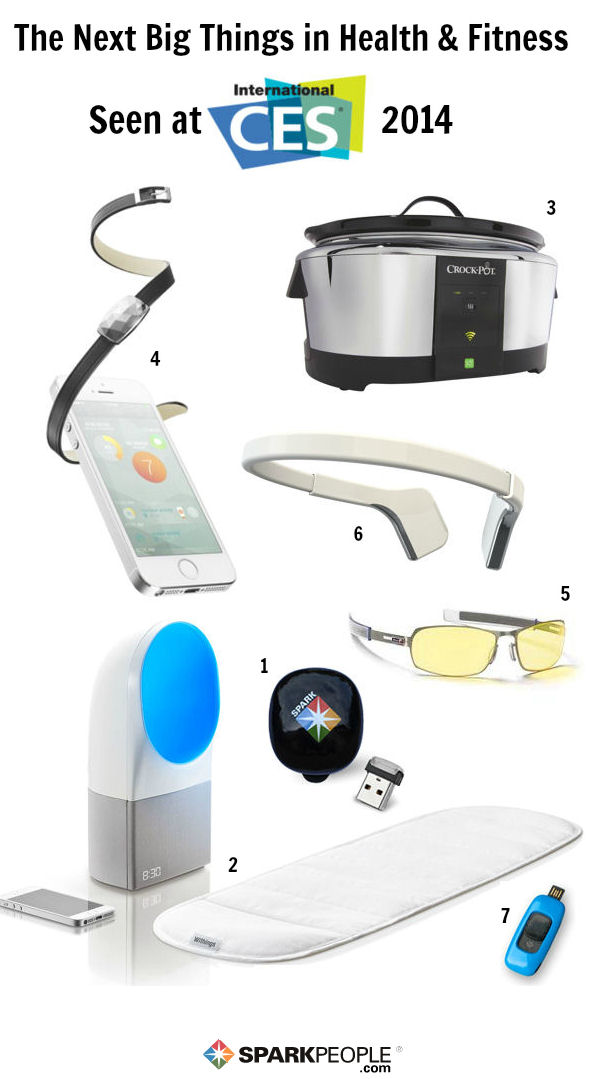 1. Wearable Fitness & Activity Trackers .png) The vast majority of digital health products you see at CES are activity trackers. You're probably familiar with big brands like Fitbit, the Spark Activity Tracker (SparkPeople has a booth at CES for the first time this year!), Jawbone Up or other monitors. I saw more brands and styles of trackers than I could count. While most of these carry the same basic features (step tracking, distance, calories, time), others had new features like long battery life that doesn't require charging, waterproof designs to help the product last longer, heart rate monitoring and more. While you can still buy small, discreet trackers that fit in your pocket, wrist bands that have all the same features (and also work as a watch) are increasing in popularity, but I suspect these are more popular among men than women. The vast majority of digital health products you see at CES are activity trackers. You're probably familiar with big brands like Fitbit, the Spark Activity Tracker (SparkPeople has a booth at CES for the first time this year!), Jawbone Up or other monitors. I saw more brands and styles of trackers than I could count. While most of these carry the same basic features (step tracking, distance, calories, time), others had new features like long battery life that doesn't require charging, waterproof designs to help the product last longer, heart rate monitoring and more. While you can still buy small, discreet trackers that fit in your pocket, wrist bands that have all the same features (and also work as a watch) are increasing in popularity, but I suspect these are more popular among men than women. The trend of wearable fitness devices isn't going away any time soon. Expect to see 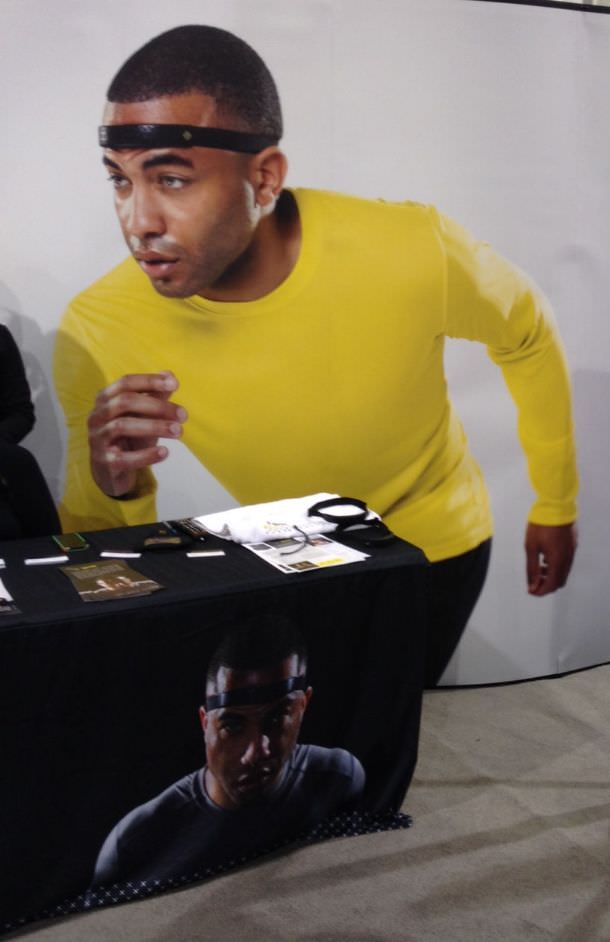 more innovation from the well-known brands and newcomers, as well as more "performance" focused trackers for athletes and runners (like offerings from Polar, Garmin, Adidas and others) that help hardcore exercisers train smarter. And yes, even dogs can wear activity trackers now. more innovation from the well-known brands and newcomers, as well as more "performance" focused trackers for athletes and runners (like offerings from Polar, Garmin, Adidas and others) that help hardcore exercisers train smarter. And yes, even dogs can wear activity trackers now.File under funny: Perhaps the strangest activity tracker I saw was designed to be strapped around one's head and forehead. The Spree headband (pictured at right) monitors many of the same things that other trackers do: distance, time, speed and calories burned, as well as heart rate. I just can't imagine opting for this Jetson-like headband when I could use a bracelet, watch or other discreet monitoring device or even an old-school heart rate monitor, which straps around your chest (under your shirt). What do you think? 2. High-Tech Sleep Solutions. Most people probably don't spend a lot of time thinking about sleep unless they have trouble sleeping. But sleep is a hot topic these days in the health and medical world. We're starting to better understand just how important it is and how much it impacts so many areas of our lives: overall health, health risk, weight, work performance and concentration, safety, hormone levels...it goes on and on. I saw a decent number of high-tech sleep solutions at CES, from remote-controlled, dual-sided mattresses to fancy alarm clocks that wake you up with soft sounds or lights. Many monitors can tell you how well you slept at night--discreetly and comfortably. 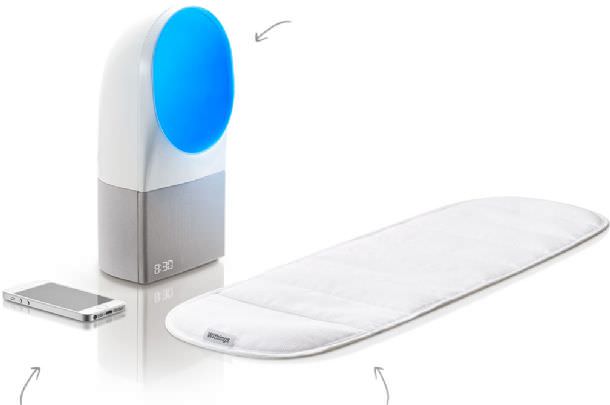 The coolest sleep solution I saw was the Withings Aura (pictured above). This device's sleek design isn't just easy on the eyes—it's made for sweet dreams! The white mat goes under your mattress and senses your breathing rate, movement (even what they dub "micro" movements) and even heart rate—yes, through a mattress! Connected to the Aura alarm and a mobile app, you'll get detailed information about your sleep. The alarm itself uses various lights to help trigger melatonin (the sleep hormone) release, and changes when it's wake-up time to wake you up subtly when you are in a light sleep cycle using soft sounds and lights. Since it knows which state of sleep you are in, it will wake you up within 30 minutes of your alarm (but not let you oversleep) when you are in the lightest state of sleep, which helps you feel more rested than you would awakening from deep REM sleep. At $299, it's slated to hit the market this spring. That price isn't cheap, but for those with sleeping troubles, it could be well worth the investment. You can even buy an additional pad for your sleeping partner and use just one alarm/clock to get detailed data on both of your sleep cycles. I, for one, would love to try something like this! 3. The Crockpot of the Future.  The beauty of slow cookers is that you can "set it and forget it." Hit a couple buttons and you come home to a warm meal. But this new slow cooker from Belkin lets you "set" it from anywhere—and won't let you forget about it. Connected with a free mobile app, you can control this slow cooker (cooking time, power, temperature and more) from your smartphone. It hits store shelves this spring for $99.99—not too shabby for the features and clean design. The beauty of slow cookers is that you can "set it and forget it." Hit a couple buttons and you come home to a warm meal. But this new slow cooker from Belkin lets you "set" it from anywhere—and won't let you forget about it. Connected with a free mobile app, you can control this slow cooker (cooking time, power, temperature and more) from your smartphone. It hits store shelves this spring for $99.99—not too shabby for the features and clean design.4. Savvy Sun Protection.  June (right), which looks like a piece of jewelry, actually helps prevent sun overexposure. We're all been guilty of staying out in the sun too long, not noticing that we've burned until it's too late. But with this product, that never has to happen again. You wear the bracelet all day as it measures your sun exposure at any given time and in total for the day via a mobile app. It shows your UV exposure, reminds you when you need to add more SPF or get out of the sun, and helps you develop a personal plan for sun protection. June (right), which looks like a piece of jewelry, actually helps prevent sun overexposure. We're all been guilty of staying out in the sun too long, not noticing that we've burned until it's too late. But with this product, that never has to happen again. You wear the bracelet all day as it measures your sun exposure at any given time and in total for the day via a mobile app. It shows your UV exposure, reminds you when you need to add more SPF or get out of the sun, and helps you develop a personal plan for sun protection.Skin cancer is the most common form of cancer in the United States, according to the CDC. Two million people are diagnosed with it each year. More people using a product like this could go a long way in helping to reduce that risk. For people who have a family history of this disease or know that they are at increased risk, this is a particularly innovative product. Even someone who simply wants to avoid sun damage (think premature wrinkles) could benefit from this technology. I like the style of the product and I love that it doesn't look like a high-tech gadget—it is actually pretty! To me the only downside is assuming that only women would use June—the design is distinctly feminine. 5. Eyeglasses for Computer Geeks.  If you have a job that involves staring at a computer screen all or most of the day, you're probably familiar with the eye strain, blurred vision and even headaches that can occur from all that monitor gazing. According to The Vision Council, this condition is called digital eye strain, and it affects 70% of U.S. adults. The Vision Council had a huge booth at CES showcasing several brands and frames of eyeglasses that have specific "computer" lenses created to reduce eye strain caused by looking at a computer monitor. If you have a job that involves staring at a computer screen all or most of the day, you're probably familiar with the eye strain, blurred vision and even headaches that can occur from all that monitor gazing. According to The Vision Council, this condition is called digital eye strain, and it affects 70% of U.S. adults. The Vision Council had a huge booth at CES showcasing several brands and frames of eyeglasses that have specific "computer" lenses created to reduce eye strain caused by looking at a computer monitor.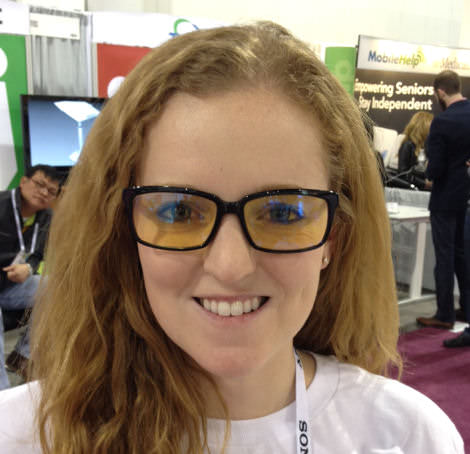 Because monitors give off a blue light (the same kind of light that can disrupt your sleep if you're looking at it before bed), these glasses are tinted yellow to diminish those effects. Some are so slight that you can't see the yellowish tint. Others, like the one I photographed to the left, are decidedly yellow. While you might look a little funny with yellow lenses, the benefits may be worth it, especially if your job involves computers. These lenses can be made with any prescription and to fit into any type of eyeglasses frames. Because monitors give off a blue light (the same kind of light that can disrupt your sleep if you're looking at it before bed), these glasses are tinted yellow to diminish those effects. Some are so slight that you can't see the yellowish tint. Others, like the one I photographed to the left, are decidedly yellow. While you might look a little funny with yellow lenses, the benefits may be worth it, especially if your job involves computers. These lenses can be made with any prescription and to fit into any type of eyeglasses frames. 6. Mindful Technology. 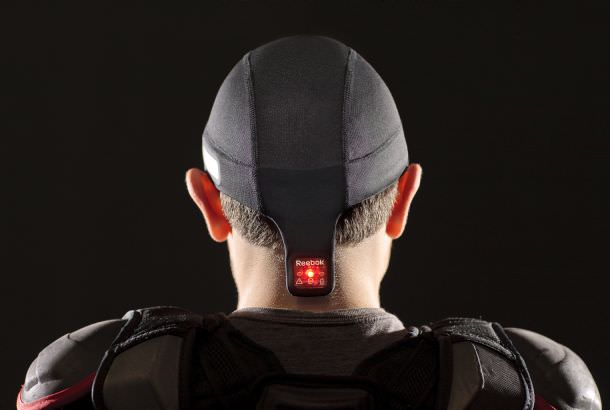 "Brain fitness" is a real trend these days as more and more people are beginning to understand that if you don't use it, you'll lose it. There is a lot that we can do to help prevent age-related mental declines, reduce stress and protect our most vital organ. Reebok introduced its first piece of wearable technology—but it's not a fitness tracker. Reebok's CHECKLIGHT ($149.99) is a sensor-filled fabric "cap" that athletes of all ages can wear (with or without a helmet) to measure head impact and, hopefully, prevent brain trauma and injuries that can occur in contact sports. It can be worn with or without a helmet, depending on the sport. "Brain fitness" is a real trend these days as more and more people are beginning to understand that if you don't use it, you'll lose it. There is a lot that we can do to help prevent age-related mental declines, reduce stress and protect our most vital organ. Reebok introduced its first piece of wearable technology—but it's not a fitness tracker. Reebok's CHECKLIGHT ($149.99) is a sensor-filled fabric "cap" that athletes of all ages can wear (with or without a helmet) to measure head impact and, hopefully, prevent brain trauma and injuries that can occur in contact sports. It can be worn with or without a helmet, depending on the sport. On another end of the brain spectrum is Muse. This headband may look futuristic, but it's not intended for all-day use. You can wear it in public (if you dare!) or in the privacy of your own home for just minutes a day. Coupled with the mobile tablet or smartphone app, you'll learn how to relax, maintain focus and stay composed in stressful situations thanks to biofeedback (or more accurately, neurofeedback). Muse measures brain wave activity and converts it into digestible digital information. You'll instantly see how "active" or calm your mind is and learn how to be more calm over time, even in distracting situations. It's almost like meditation on steroids—or a gamified way to reduce stress and calm your mind. Priced at $269 and set to release mid-year, I wouldn't be surprised if doctors, therapists or even employee wellness programs introduce a stress-reduction gadget like this to their patients and employees, respectively. (Bonus: One piece of Muse hardware can be used by countless individuals who all create a separate log-in on the app, according to the Muse representative I spoke to.) On another end of the brain spectrum is Muse. This headband may look futuristic, but it's not intended for all-day use. You can wear it in public (if you dare!) or in the privacy of your own home for just minutes a day. Coupled with the mobile tablet or smartphone app, you'll learn how to relax, maintain focus and stay composed in stressful situations thanks to biofeedback (or more accurately, neurofeedback). Muse measures brain wave activity and converts it into digestible digital information. You'll instantly see how "active" or calm your mind is and learn how to be more calm over time, even in distracting situations. It's almost like meditation on steroids—or a gamified way to reduce stress and calm your mind. Priced at $269 and set to release mid-year, I wouldn't be surprised if doctors, therapists or even employee wellness programs introduce a stress-reduction gadget like this to their patients and employees, respectively. (Bonus: One piece of Muse hardware can be used by countless individuals who all create a separate log-in on the app, according to the Muse representative I spoke to.)7. Fitness Games & Gadgets for Kids.  Childhood obesity and inactivity is a huge problem these days. Countless parents wonder how they can motivate their kids to exercise and make it seem like fun instead of a chore. I had the pleasure of talking with Zamzee's Vice President, Dan Botwinick at CES. Zamzee is an activity tracker and program designed specifically for kids. It has a low price point (under $30) and uses behavioral psychology and gamification to make it fun and rewarding for kids to become more active—in whatever ways they enjoy. What's even cooler is that kids can earn real rewards like amazon.com gift cards for increasing their activity, and they get rewarded using the program based on where they started—not based on ideal fitness recommendations that they might not measure up to at first. Zamzee activity trackers also come in a variety of fun prints and colors. Research shows that Zamzee can increase a child's activity level by an average of 59%. Childhood obesity and inactivity is a huge problem these days. Countless parents wonder how they can motivate their kids to exercise and make it seem like fun instead of a chore. I had the pleasure of talking with Zamzee's Vice President, Dan Botwinick at CES. Zamzee is an activity tracker and program designed specifically for kids. It has a low price point (under $30) and uses behavioral psychology and gamification to make it fun and rewarding for kids to become more active—in whatever ways they enjoy. What's even cooler is that kids can earn real rewards like amazon.com gift cards for increasing their activity, and they get rewarded using the program based on where they started—not based on ideal fitness recommendations that they might not measure up to at first. Zamzee activity trackers also come in a variety of fun prints and colors. Research shows that Zamzee can increase a child's activity level by an average of 59%. It's pretty amazing to see how far we've come with technology and how it can improve our health and fitness. These few products are just the tip of the iceberg, too. We are a digitally driven world, and with all of the health concerns we face these days, it's great to see that all this technology that surrounds us is starting to be used in ways to help us live healthier lives. Do you think technology helps or hurts our health overall? Which of the CES health innovations above are most interesting to you? |
More From SparkPeople
|





.png)









